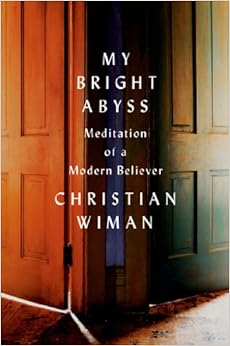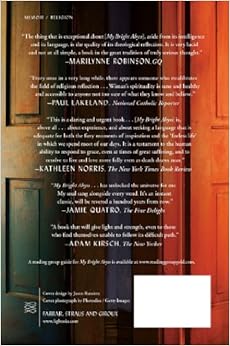







Product Details
Would you like to update product info or give feedback on images?.
|
Praise for My Bright Abyss
“[Christian Wiman’s] poetry and his scholarship have a purifying urgency that is rare in this world. This puts him at the very source of theology, and enables him to say new things in timeless language, so that the reader’s surprise and assent are one and the same.” —Marilynne Robinson, Pulitzer Prize–winning author of Gilead
“Every generation needs someone to write about faith as lucidly as Christian Wiman does in this ‘meditation of a modern believer.’” —The Wall Street Journal
“Christian Wiman’s My Bright Abyss creates in the reader the keen, poetic attention of a man with a cancer diagnosis trying to remain fully present in his life. His spiritual ancestors are C. S. Lewis and Thomas Merton. Like Lewis, he’s surprised by the joy of falling in love. Like Merton, he captures the smugness that can poison some atheists as it does some believers. This masterwork of doubt and faith, literature and theology, will affect nonbelievers and spiritual seekers alike.” —Mary Karr, author of Lit and The Liar’s Club
“In another day and age, this book would be called a revelation, a mysticism, a holy text. What does it mean for a modern man to believe? In this extremely moving narrative, this question is asked with grace and fury, with astonishing eloquence and courage that only a few can equal in our time. It will be read for years and years to come.” —Ilya Kaminsky, author of Dancing in Odessa
“Forged from pain, like most masterpieces, My Bright Abyss provides an advanced course in applied mysticism for the twenty-first century.” —Eliza Griswold, author of The Tenth Parallel
“Christian Wiman has written a moving, thoughtful meditation on faith and poetry that is really a treatise on meaning: where we find it, what it offers us, whether it can mitigate pain. There’s a luminous clarity in these pages, the kind that comes only when a writer is facing ultimate questions.” —Meghan O’Rourke, author of The Long Goodbye
“My Bright Abyss . . . has unlocked the universe for me. My soul sang alongside every word. It’s an instant classic, will be revered a hundred years from now.” —Jamie Quatro, The Fine Delight
“Like the classic mystics, [Wiman] often resorts to a language of paradox to convey things that ordinary language can’t … Wiman speaks carefully but powerfully . . . The best that can come from contemplation of mortality, perhaps, is a kind of wisdom that can give others strength—not by answering questions, like those best-sellers which claim to tell you what happens after you see the white light, but by asking questions honestly . . . My Bright Abyss is a book that will give light and strength, even to those who find themselves unable to follow its difficult path.” —Adam Kirsch, The New Yorker
“This is a daring and urgent book . . . More than any other contemporary book I know, My Bright Abyss reveals what it can mean to experience St. Benedict’s admonition to keep death daily before your eyes . . . Wiman is relentless in his probing of how life feels when one is up against death . . . With both honesty and humility, Wiman looks deep into his doubts his suspicion of religious claims and his inadequacy at prayer. He seeks ‘a poetics of belief, a language capacious enough to include a mystery that, ultimately, defeats it, and sufficiently intimate and inclusive to serve not only as individual expression but as communal need. This is a very tall order, and Wiman is a brave writer to take it on . . . Wiman mounts a welcome, insightful and bracing assault on both the complacent pieties of many Christians and the thoughtless bigotry of intellectuals who regard Christian faith as suitable only for idiots or fools . . . This pithy and passionate book is not easy, but it is rewarding. Wiman’s finely honed language can be vivid and engaging . . . He exhibits a poet’s concern for precision . . . This is, above all, a book about experience, and about seeking a language that is adequate for both the fiery moments of inspiration and the ‘fireless life’ in which we spend most of our days. It is a testament to the human ability to respond to grace, even at times of great suffering, and to resolve to live and love more fully even as death draws near.” —Kathleen Norris, The New York Times Book Review
“Burnished and beautiful, My Bright Abyss is a sobering look at faith and poetry by a man who believes fiercely in both, but fears he might be looking at them for the last time. Wiman’s memoir is innovative in its willingness to interrogate not only religious belief, but one of its most common surrogates, literature . . . Wiman’s story is chiefly a love affair: of a poet with words, of a husband with his wife and two daughters, of a believer with the holy . . . Here is a poet wrestling with words the way that Jacob wrestled the angel . . . Wiman calls his memoir the “Meditation of a Modern Believer,” and it is that, but more than meditation, it is an apologia and a prayer, an invitation and a fellow traveler for any who suffer and all who believe.” —Casey N. Cep, The New Republic
“In verse and poetry alike, Christian Wiman possesses and endearing and profound spiritual sensibility . . . My Bright Abyss is built of prose so lyrical and true you want to roll it around in your mouth and then speak it to strangers on the street . . . Wiman refuses easeful conclusions, he celebrates the verse and the two-faced joy at the hub of our lives—Nietzsche’s tragic joy—and in doing so he has written what will be for many a life-changing book.” —William Giraldi, Virginia Quarterly Review“In My Bright Abyss: Meditation of a Modern Believer . . . Christian Wiman—himself a fine poet and translator of the Russian poet and essayist Osip Mandelstam—contemplates the meaning of poetic incarnation in specifically Christian terms, drawing on a wide range of authors. He blends poetry (his own and others’), criticism, theological speculation, and memoir in ways that defy easy categorization . . . Throughout My Bright Abyss, Wiman avoids formulaic responses. His prose is poetry in the truest sense: language adequate to one person’s experience . . . Wiman’s book is a moving argument for the use of poetry as a spiritual guide . . . [Wiman] shows us what happens to a man when his relation to the divine is reawakened, his mind becoming alert in ways previously unimaginable. That alertness carries over into his readings of poetry, which occur in a pressured context, as the language of the poems becomes part of his evolving mental landscape, part of his recovery, his spiritual (as well as physical) survival . . . In My Bright Abyss, Wiman offers a demonstration of what faith means to a critic: not a new way of life but, more mysteriously, the old life freshly understood, filtered through a range of texts. He reminds us that revelation comes not in a whirlwind or fire, but in that ‘still, small voice’ that came to Elijah in the desert. ‘The voice is always there, for everyone,’ writes Wiman. ‘For some of us, unfortunately, it takes terror and pain to make us capable of hearing it.’ It is this urgency that separates the wheat from the chaff among critics.” —Jay Parini, The Chronicle Review
“Wiman isn’t the least bit sentimental or nostalgic about the deeply Christian faith that provides the bedrock for his meditation . . . I can think of only a handful of writers I’ve read who have diagnosed the contemporary spiritual condition as poignantly as Wiman. But he doesn’t stop at ‘reading the times.’ Wiman weaves an intensely personal account of the hard work of maintaining belief in the midst of a culture determined to identify itself as secular . . . The poet is always wide-eyed and available to the world, but Wiman has the kind of gaze that Flannery O’Connor says is peculiar to the Catholic writer: their seeing continues deep beneath the surface of what all of us can plainly see . . . [My Bright Abyss] is breathtakingly beautiful and astonishing in its wisdom. . . hands down, the best book I’ve read in more than a decade.” —...
Christian Wiman is the author of six previous books, most recently Every Riven Thing (FSG, 2010), winner of the Ambassador Book Award in poetry, and Stolen Air: Selected Poems of Osip Mandelstam.